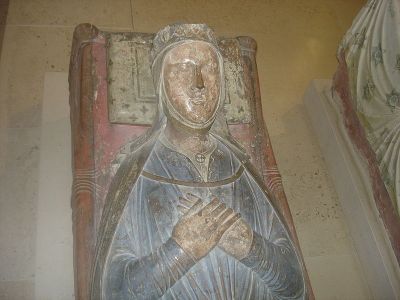Isabella of Angoulême was crowned Queen consort of King John, at which time she  was only 12 years old on this day, October 8 1200.
was only 12 years old on this day, October 8 1200.
She was the daughter of Aymer, the last Count of Angoulême of the House of Taillefer. After having been Queen of England for two years Isabella became Countess of Angoulême in her own right as her father died.
Isabella is said to have been a great beauty, but allegedly had a temper which was comparable to that of her husband, causing the marriage to deteriorate over time (even if the marriage had been a political coup for John, there are suggestions that he was infatuated with her at least for a time).
In relation to children, Isabella was fortunate compared to many other women of the period in the was that she got to see them all reach adulthood, and there was quite a few, in her marriage to John, five children were born, the oldest becoming Henry III at the time of John´s death.
After becoming the Queen dowager, she married Hugh X of Lusignan, the son of her former fiancée to who she had been betrothed when she´d been married to John and had another nine children. The plan had been to marry her eldest daughter to Hugh, but when he saw the beauty of his future mother-in-law, things took quite another turn.
Through this marriage she angered the King´s Council as she had not asked for their consent, and chances are, as they could make the decision, is that they may not have allowed her to remarry at all. As a punishment, they confiscated all her dower lands, with the result that she threatened to keep Princess Joan, promised in marriage to the Scottish king, in France. This escalated the conflict to the point where the council started sending letters to the Pope in the name of the young king, demanding that Isabella was excommunicated. The two parties managed however to reach an agreement.
After not being shown sufficient respect as Queen Dowager of England by the French Queen Blanche, for whom she had nothing but hate going back to 1216 when Blanche had encouraged an invasion of England in support of the Barons, she set plans in motion to create an English confederacy in France, something that came to nothing. After her second husband had made peace with the French king, Isabella´s resentment continued to simmer, and in 1244 she was accused of having bribed to royal cooks to poison the king.
Rather than accepting the consequences, she fled to Fontevraud Abbey where she died two years later, in 1246, 30 years after her first husband.
Sources:
King John and the road to Magna Carta – Stephen Church
The Magnificent Century – Thomas B. Costain
King John – Treachery, Tyranny and the road to Magna Carta – Marc Morris